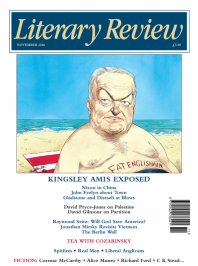John Laughland
John Laughland on a Half Century of Unrest at the UN
Since the end of the Cold War, two positions have seemed to harden on the United Nations, whose fiftieth anniversary falls this year. On the one hand, warmongers in the United States and Britain regard the organisation with contempt, seeing it as a conspiracy of Euro-weenies and Third-World dictators to prevent the onward march of democracy and American power. On the other hand, peaceniks support the UN on the basis of a similar analysis: imbued with memories of forty-five years of imperial roll-back, during which the UN was a platform for various fashionable Third World causes and for the principle of decolonisation generally, they think of it as mankind’s only protection against the vagaries of a unipolar world.
Being two sides of the same coin, these views are both wrong. As James Traub points out in The Best Intentions: Kofi Annan and the UN in the Era of American World Power (Bloomsbury 464pp £20), ‘Institutions of global order are an American invention.’ Created at San Francisco and based

Sign Up to our newsletter
Receive free articles, highlights from the archive, news, details of prizes, and much more.@Lit_Review
Follow Literary Review on Twitter
Twitter Feed
The son of a notorious con man, John le Carré turned deception into an art form. Does his archive unmask the author or merely prove how well he learned to disappear?
John Phipps explores.
John Phipps - Approach & Seduction
John Phipps: Approach & Seduction - John le Carré: Tradecraft; Tradecraft: Writers on John le Carré by Federico Varese (ed)
literaryreview.co.uk
Few writers have been so eagerly mythologised as Katherine Mansfield. The short, brilliant life, the doomed love affairs, the sickly genius have together blurred the woman behind the work.
Sophie Oliver looks to Mansfield's stories for answers.
Sophie Oliver - Restless Soul
Sophie Oliver: Restless Soul - Katherine Mansfield: A Hidden Life by Gerri Kimber
literaryreview.co.uk
Literary Review is seeking an editorial intern.